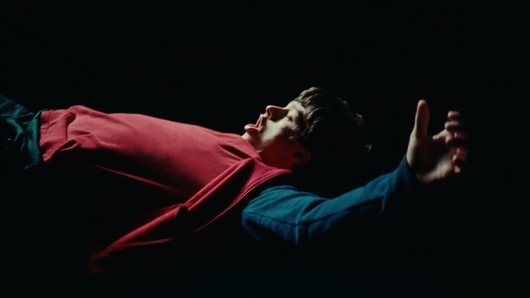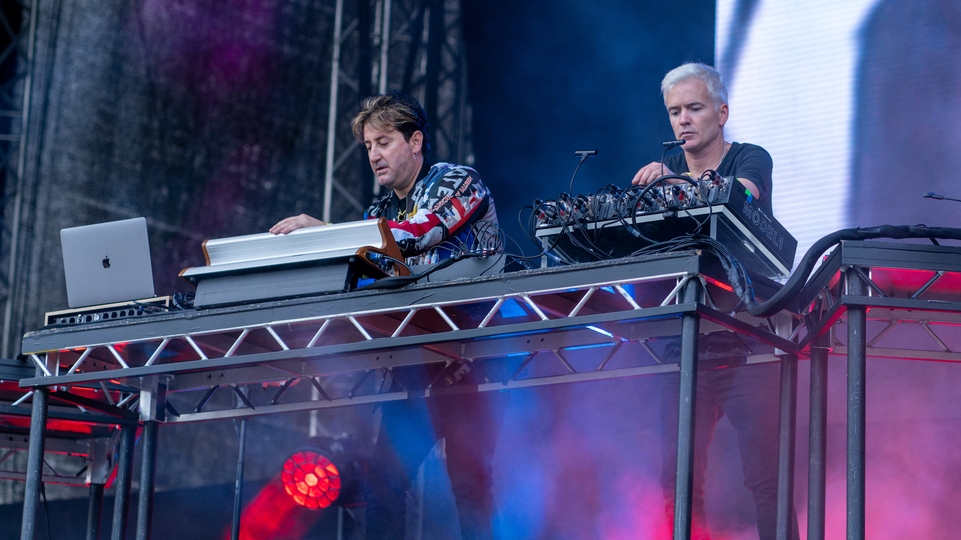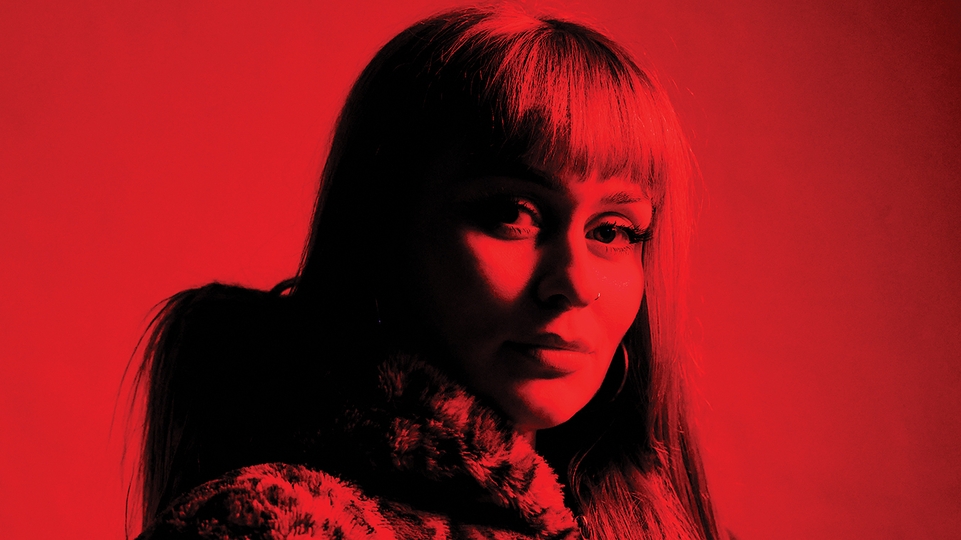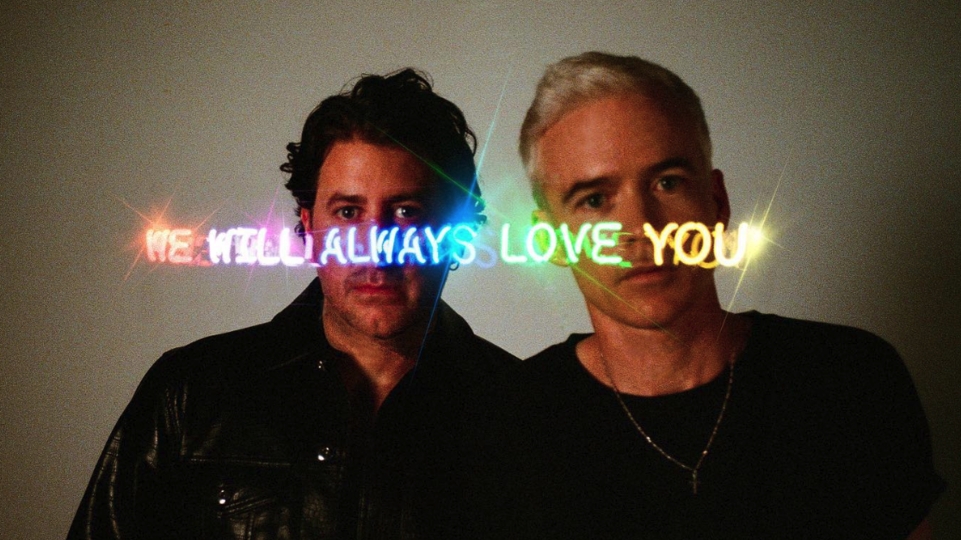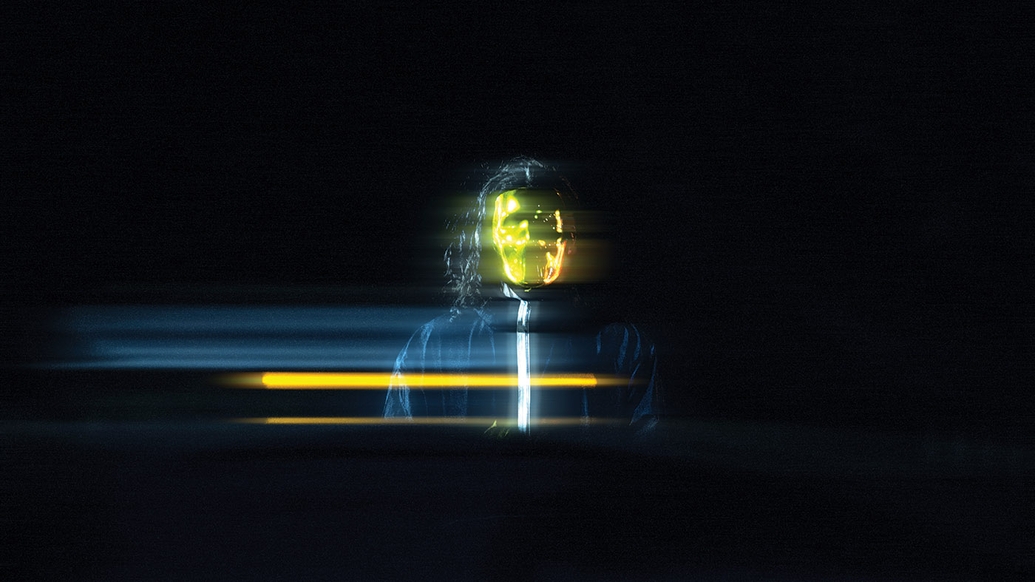
Golden Features: pushing onward
The life of an artist is often defined by exhausted valleys, shimmering peaks and the arduous path between those two points. In Golden Features’ sophomore studio album ‘Sisyphus', the Australian producer Thomas George Stell explores this concept, drawing from his unexpected experiences in Berlin’s club scene and beyond
Is there a fate worse than death? Well, it depends on who you’re asking. We’d ping Sisyphus for his take, but that guy’s busy, forever pushing an enormous boulder toward a mountain peak he’ll never reach. Now, that’s a dude who fucked around and found out. The tragic figure learned firsthand that Zeus doesn’t take kindly to mortals that swerve their own demise, much less those who dodge death twice. And what’s the perfect punishment for an egotistical king who avoids closure at all costs? An existence void of ultimate satisfaction sounds just about right.
“I can get so negative about it sometimes, but there is this feeling. It’s like, you work on music. It's exciting. And then it gets difficult. And it feels like it’s the last thing you'll ever do,” the Australian DJ and producer Thomas George Stell tells DJ Mag on a video call from his home studio in Sydney. “Then it’s done and you start again. You write another album. It’s done, and then you start again.” He sounds a bit wiped, and reasonably so.
The Greek myth in reference resonates with our subject, who’s known better as the masked performer, Golden Features. As an artist, Stell accepts a reality marked by insurmountable summits, ever-moving goalposts and a perpetual struggle to glean any real sense of accomplishment from the journey, even when there is no cut-and-dry ending. That’s one reason why his latest LP shares its namesake with the ancient character. “There’s something beautiful, I suppose, in finding the moments in those processes,” he continues. “But then there's a huge part of me that thinks, is it this and then death? Maybe I cursed myself by calling [the album] ‘Sisyphus’ because it's been the hardest process of my life.”
When we speak with Stell, he’s admittedly under the weather — a sensation compounded by the bottle of wine he downed the night prior in hopes of sleeping off a stubborn cold. Thankfully, feeling like crap can border on lucidity, which aids in our discussion about his latest body of work. This is the period when Stell claims to be “at his worst” — when months of gruelling, 10-hour studio days are replaced by waves of nervous anticipation and looming uncertainty.
“Everyone throws around that ‘perfection’ word like it's a badge of honour,” he says, in a way that suggests he’s guilty as charged. “But I think a lot of people are understanding now that the idea of being a perfectionist is trying to protect yourself from the shit you’re terrified of. It’s why you need another rewrite, it’s why you need another crack at notes, it’s why you need another whatever. Because if you're in that limbo, and you stay within that vacuum, you never have to confront the outside world.”
Confrontation is imminent, but we suspect Stell’s greatest critic will turn out to be himself. ‘Sisyphus’ was released via the Foreign Family Collective imprint on July 7th, and the nine-track collection is a mesmerising symphony of cascading melodies, synthesised drums and intrepid breakbeats, culminating in what is his best creation yet. A marked departure from his 2018 debut album ‘SECT’, which led with bass-driven, four-on-the-floor cuts, Golden Features’ newest offering is fuelled by leftfield, and at times, techno-fied textures that are as intoxicating as they are unique.
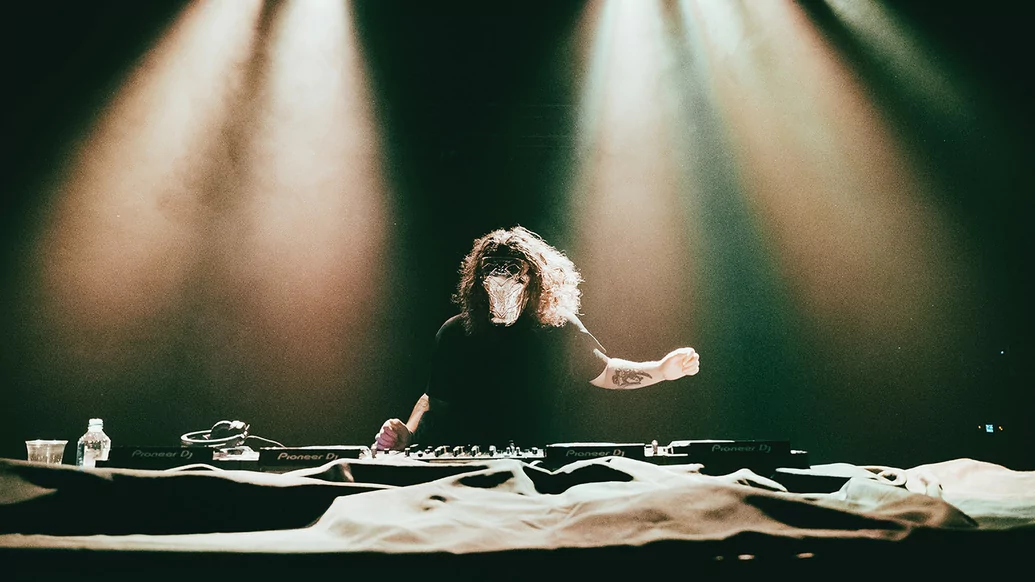
‘Sisyphus’ is a creative peak — the outcome of three rigorous uninterrupted years in the studio, inspired in part by Stell’s 2020 trip to Berlin during which the Aussie beatmaker rekindled his love for electronic music. All he had to do was step outside of his comfort zone into winding club queues with zero guarantees. “There's a club that closed long before we arrived, but it was called Sisyphus, and it got me thinking about the story,” Stell tells of his pre-pandemic visit to the German capital and how the long player’s title came to be. “Over there, I was reliving my late teens/early 20s, more or less, following this whole pattern: get excited, stand in a line waiting and hoping to get in, have this insane experience, then leave, wake up, and do it again.”
He drew fresh energy from unpredictable nights, where after years of assured guest list access, he returned to his roots as a regular raver. He and his friends tried their luck at famously hard-to-get-into clubs like ://about black and Berghain often completely unaware of who was spinning inside (the latter club merits a return visit — he’s still never made it past the door.) “As you indulge in everything Berlin has to offer, the next day, typically you have the come down, which makes me feel very introspective,” Stell shares of the hazy, self-reflective valleys that followed those highs. “Some of those come downs got me to thinking ‘what the fuck am I doing with my life?’ in every sense of the word. Just like the daily cycles in the Sisyphus story, I’d think ‘was this just an attempt to find meaning and something bigger than yourself?’”
The holiday came at a pivotal time for Stell, who’d just wrapped production on the self-titled ‘BRONSON’ LP — a collaboration with live electronic duo, ODESZA. After pouring himself into the project, he was back at the bottom of the metaphorical hill, unsure of what to focus on next. Jaded with the oversaturated state of popular electronic music, he set off on his first vacation in years, and the last for many to come — the world went into lockdown just one week after he returned home to Australia. “I re-energized myself a little bit before having virtually no outside stimulation for six months, or whatever it was. I also thrive in isolation, which is really sad,” he says, letting out a knowing chuckle. With blinders on and little outside distraction, Golden Features leaned into the studio with a fresh palette of personal experience to guide him.
“The album is symbolic of the direction my tastes were going,” he shares of how his exposure to underground sounds gave rise to ‘Sisyphus’. “I feel like electronic music or ‘EDM’, if you want to call it that, is so limited in what it can achieve. I Remember this Daft Punk interview from a little while ago and they said, ‘EDM’ is like an ‘audio energy drink’, and that's what’s always bugged me about it.” Instead, Stell turned his attention to outside artists who’ve mastered the art of sonic storytelling. “The Chemical Brothers walk that line — it’s this maximalist sound, but there's some emotion that they're imprinting on you,” he offers as an example of an act with an inspiring trajectory.
The UK-duo’s influence rings with subtlety in discordant tracks, like ‘Hound’, where warm vocals float over discordant synths and gritty breakbeats. ‘Endit’ featuring frequent collaborator and Australian vocalist Rromarian is another lyrical stunner that soars on syncopated drums and interloping melodies. Then there are crushers — like ‘Vapid’ with France-based producer Louisahhh — that seem to borrow a page right from Berlin’s book. In the peak-time techno triumph, Stell builds towering walls of bass and ascending variation, before tearing them down into minimalist interludes. The latest single, ‘Flesh’, is a thumping banger that unfolds into unforeseen mellifluous horizons, acting as a microcosm for some of the greater themes that weave through the album.
There’s emotion and filth, cacophony and harmony, and an impressive use of melodic highs and devastating lows that — despite their many differences — feel authentic to Golden Features’ evolving soundprint. This is likely due to the fact that Stell avoids ever repurposing the same sounds over multiple songs. “I’ll never use the same sound twice. Everything’s from scratch all the time,” he explains before showing us where the magic begins, spinning his camera around the room to reveal an impressive setup that includes a Eurorack modular system, Roland Chorus Echo, Roland SH-101, Korg Mono/Poly, MFB Dominion1 and a Korg Minilogue. “I love picking things apart. I really love reverse engineering things and then filtering them through my own lens,” he adds, finally alluding to the simple joys that keep him motivated.
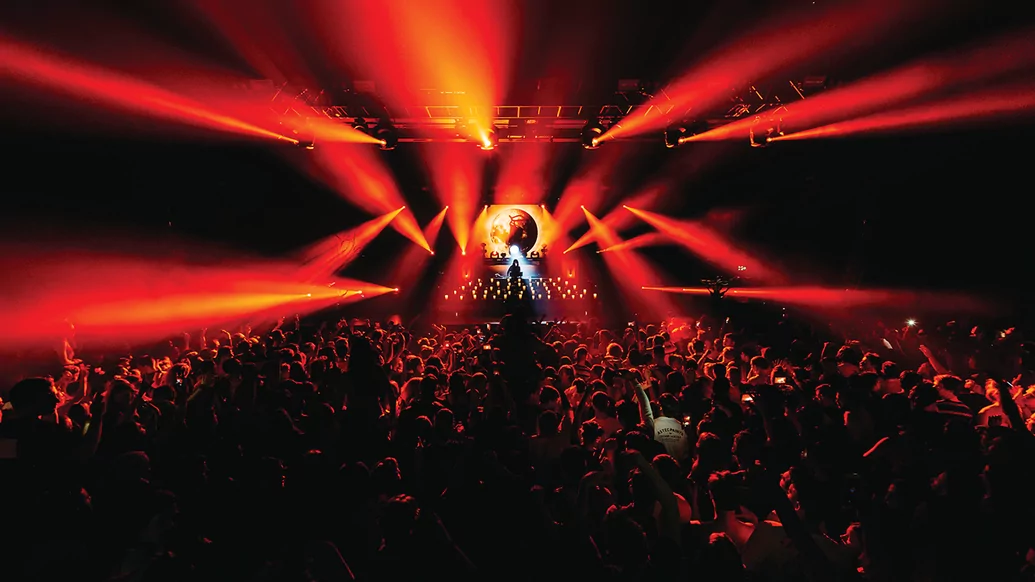
Stell could rip through sample packs like so many other electronic artists, but he gets his thrills from self-imposed challenges. Long before he dawned the gleaming gold mask before global audiences, he poured his creativity into another kind of ephemeral art: graffiti. As a teenager, he ran with an established graff crew in Sydney, tagging surfaces that moved far too fast for most eyes to fully appreciate. “I used to paint trains. Which I suppose is the most hardcore approach,” he explains of a former passion that landed him in hot water with the city’s Rail Vandalism Task Force. “It’s like the techno of graffiti — that’s what we call it because we’re not doing this for you. You paint something and it runs to the yard instantly. You’re lucky if you even get a picture of it before it’s gone.”
When he turned 18, he left the adrenaline-pumping craft behind, aware that a second offense could jeopardize his chances of traveling or spinning records (which were hip-hop-oriented back then) around the world. Still, the lessons he learned on the street remain integral to his beat-building. “I keep coming back to graffiti because it really formed a way that I express myself,” he explains with a hint of nostalgia. “I remember asking someone back then, ‘how do you get your own style?’ And he goes, ‘well you take a piece you like the most from each of the people that you love. And then you just add that to your toolkit, and eventually it will all blend together into something no one’s ever seen.’ When I think back, I’m like okay, why was he so emotionally intelligent at 16 to be able to tell me that? But it's stuck with me.”
Now, Stell infuses his productions with the experiences, influential artists and techniques that compel him. “Each project that comes around, I'm just trying to add a bunch of things to the toolkit to keep moving, but keep shaping my sound at the same time,” he elaborates. “‘SECT’ was going backwards and listening to Ed Banger and Justice and some of the music that really was there when I got my foot in the door with electronic music, trying to add to what I already had.” ‘Sisyphus’, on the other hand, is stamped by more abstract elements — the thrill of crossing a new club’s threshold, visceral, audio-driven narratives and the insatiable desire to create art that simply cannot be replicated by others.
“That's what I miss about graffiti — if you copied someone else's style, they would fucking find you and beat the shit out of you. There are real world ramifications for stealing something that someone's worked so hard for. And I think in music, especially in popular music, it's like no one gives a shit — they just want more of the thing that they want more of, and it doesn't matter how they get it. And I think that just fucking blows.”
Stell is quick to pour water on his words, asserting that he’d never advocate for violence among producers. He just wishes more of his peers were willing to innovate, instead of approaching art with a rinse and repeat mindset. Besides, “the Dark Prince of Foreign Family Collective” — a title bestowed to him by an enthusiastic fan at ODESZA’s 2019 Sundara Festival — has a more effective outlet for managing frustrations: he’s a member at a local boxing gym, where he routinely spars with professional MMA fighters and boxers.
“You see what they put themselves through, in that one moment to prove something to themselves,” he explains. “It’s not easy. They don't go into the gym everyday happy — in fact, some of the best days they have are when they're not happy, and that's a beautiful way of living. It's just accepting that the best things in life come at a price.” Stell’s learned from their commitment and intensity, and says it’s another slice of inspiration that’s given him clarity and forward momentum, especially in the stretches when he feels like he can’t push the boulder any further. Finally, we just ask Stell outright, “Are you happy with this album?”
“No,” he responds without missing a beat. “But, to preface that, I've never been satisfied with anything I've ever made, ever. I don't think I've ever stepped away from anything and not been unwell and truly exhausted.” He takes a long pause, as though feeling the cumulative weight of the last several years. “I would say that this is the happiest I've ever been with something I’ve made. When I ignore all the imperfections, I can see this was worth something — worth the time, the lack of sleep, the million mini-meltdowns I had — I'm deeply proud of it.”
Like Sisyphus approaching the summit, Stell acknowledges that this feeling, too, is fleeting. Release day will always come and go, and then it’s back to the base again, before moving uphill toward a pinnacle of satisfaction that’s destined to escape his grasp. So, we’ll ask once again. Is there a fate worse than death? There sure is — it’s called being an artist.

